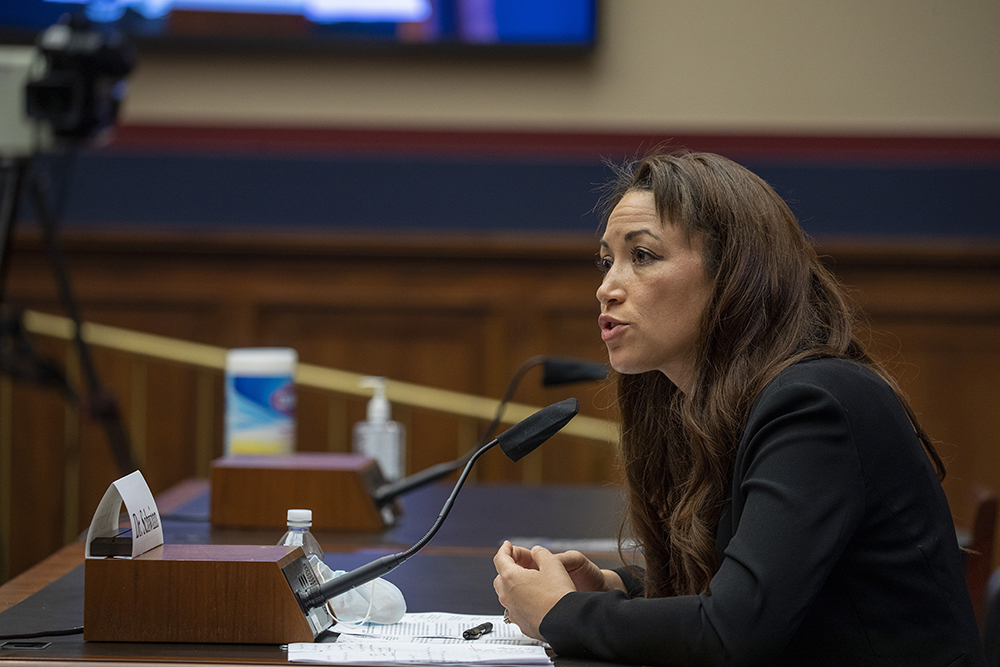Exclusive: Penny Schwinn, Influential Tennessee Education Chief, to Step Down
Known for overhauling literacy efforts and ushering in a tutoring initiative during the pandemic, she decried ‘distracting’ culture war politics

Get stories like this delivered straight to your inbox. Sign up for The 74 Newsletter
Updated
Tennessee education chief Penny Schwinn, one of the nation’s most high-profile state superintendents, who worked to expand tutoring and revamp literacy during the toughest days of the pandemic, will announce today that she is stepping down, effective June 1.
In addition to launching the tutoring initiative to curb learning loss, Schwinn shepherded a new school funding formula through the legislature and positioned Tennessee as the first state with a federally registered teacher apprenticeship program. At the same time, she told The 74 in an exclusive interview last week, she weathered distracting culture war battles over the way race and gender is taught in the state’s classrooms.
“I see it as extraneous politics and my job is to educate kids,” she said. “I knew that my charge, first and foremost, was to move our state forward.”
A Republican, Schwinn faced criticism from Democrats and GOP leaders alike for issues ranging from the teaching of American history to her support for charter schools.
Last fall, she told Republican Gov. Bill Lee that she didn’t plan to stay through his second term. Lee will appoint Lizzette Gonzalez Reynolds, a school choice advocate with experience in state and federal policy, to be her successor.
Currently vice president of policy with nonprofit ExcelinEd — which has been instrumental in the rapid expansion of education savings accounts in Republican-led states — Reynolds said she plans to pick up where Schwinn left off.
“It’s an absolute joy to be tapped for this role and to continue this work,” she said.

A former Teach for America leader from California, Schwinn held high-level positions in the Delaware and Texas education agencies before Lee appointed her commissioner in 2019. She had a rocky start in Tennessee, initially facing criticism from lawmakers for being an outsider. Even though she’s a Republican, her policies were not always well received by more conservative members of her own party. But under her leadership, the state won praise from literacy advocates for requiring districts to use a phonics-based approach, training teachers in those methods and providing free curriculum resources.
“Dr. Schwinn has successfully executed a culture and curriculum shift to the science of reading that no other Tennessee state commissioner could do,” said Sonya Thomas, executive director of Nashville Propel, a parent advocacy organization. “Under her leadership, we have become a national leader in literacy reform.”
Julia Rafal-Baer, founder of ILO Group, a consulting firm focused on leadership opportunities for women in education, added that Schwinn has had a “seismic impact” as commissioner, inspiring other women in the profession. On Friday, Schwinn addressed members of a national network of women superintendents, where she spoke in part about the importance of navigating politics in the top job.
“I said to keep kids as your north star because that’s common ground,” she said. “Ignore the distractions and get a thick skin because everything in education is personal, but you can’t take it personally.”
Tennessee has been in the spotlight not just for post-pandemic recovery efforts, but also for a legislative proposal to phase out federal funding, as well as controversies over teaching America’s fraught racial history and the state’s ban on transgender youth receiving gender-specific health care.
In 2021, a state Moms for Liberty chapter accused Schwinn of dodging their complaint about the Williamson County district’s use of an elementary reading curriculum, which includes the children’s book “Ruby Bridges Goes to School: My True Story.” The autobiography recounts Bridges’s experience as the first Black student to desegregate an all-white school in New Orleans. But some parents objected to the book’s use of words such as “injustice” and “unequal” and references to “a large crowd of angry white people.”
The complaint focused on lessons during the 2020-21 school year. Schwinn largely sidestepped the issue, responding that the law requiring the state to investigate possible violations didn’t kick in until the following year.
From Democrats, she’s faced criticism for her ties to charter schools (she founded one in Sacramento) and questions about possible conflicts of interest involving her husband, Paul Schwinn, a leadership coach for TNTP. The nonprofit, which works in districts to improve teacher quality, had a contract with the state as part of its reading initiative, but Schwinn received approval from the state and promised to distance herself from the agreement.
“Whichever side you’re on or whichever kind of philosophy you have, there’s always another push that is frankly very distracting,” Schwinn said. “It can come from the left or the right, and I think it has really decimated our leadership nationally.”
Of the 38 states where superintendents are appointed and not elected, Tennessee will be the 17th to have a new permanent or acting chief since January 2022 — a mark of the widespread leadership turnover in the profession since the pandemic.

But John Bailey, a consultant and visiting fellow for the conservative American Enterprise Institute, noted that Schwinn had a longer run than some state chiefs. Jillian Balow, appointed Virginia education chief by Gov. Glen Youngkin in January 2022, recently stepped down after just a year. She previously spent eight years leading Wyoming’s education department.
Schwinn’s “superpower,” Bailey said, has been her ability to “bridge differences that are sometimes political and sometimes just normal policy tensions.”
‘Foundation of success’
Schwinn noted, for example, first lady Jill Biden’s visit last year to the University of Tennessee, Knoxville, to highlight the state’s grow-your-own teacher preparation program.
“I have a great relationship with that administration as I serve very loyally my own,” she said, calling Lee “unwaveringly supportive” during her tenure. “He said, ‘Penny, go do your job, and your job is to make sure our kids are accelerating faster than ever before.’ ”
Schwinn and Lee worked together to gather public input on how the state funds schools. On top of a base amount for each student, the new system provides additional funding for students with greater needs as well as ongoing funding for tutoring, early literacy and career and technical education.
In a statement Monday, Lee said, “Penny has played a key role in our administration’s work to ensure educational opportunity for Tennessee students and secure the next generation of teachers, while navigating historic learning challenges.”
Last year, Schwinn celebrated state test scores showing Tennessee students had largely recovered from pandemic-related declines, which leaders attributed partly to recovery efforts like tutoring and summer school. But those wins quickly were overshadowed by sharp declines in math and reading performance on the 2022 National Assessment of Educational Progress, especially in the Memphis-Shelby County Schools. The mismatch is not unusual. State tests more closely cover state standards than the national test. Students also took NAEP before tutoring efforts were widely implemented.
Meanwhile, the state’s effort to turn around performance in many Memphis schools has been a disappointment, Schwinn said.
Since the Achievement School District began a decade ago, the schools involved have made little, if any, academic gains. The state is now revamping the model, reducing the number of charter school operators running schools. But Schwinn added, “I regret that we didn’t move faster on that. The kids deserved us to move faster.”
She also regrets not spending more time on students’ mental health. She called federal data on the issue — which lists suicide as the third leading cause of death among 14- to 18-year olds — “frightening” and said the state still needs “a really clear, tight and well-articulated plan” to respond to students in crisis.
Early in the pandemic, she took heat from GOP state lawmakers for a plan to use $1 million in federal COVID relief funds for districts to conduct “well-being checks,” particularly for students who didn’t participate in remote learning while schools were closed.
House Education Administration Committee Chair Mark White, for example, told reporters he received calls from parents concerned about government intrusion. And Rep. Scott Cepicky suggested Schwinn was more concerned with her own agenda and didn’t consult with those “elected by the people of Tennessee.”
“I think there’s still a huge lack of communication to the General Assembly and to [local] superintendents and school boards,” Cepicky said Monday. “I think that was one of the pitfalls of Commissioner Schwinn and her regime.”
Schwinn declined to say what she’ll be doing next, but said she has “quite a few good opportunities” and expects to make a decision in about a month.
Reynolds, her successor, said her first priority will be ensuring eligible families can take advantage of the state’s targeted ESA program. It’s currently open to students in Shelby and Davidson counties, which include Memphis and Nashville, respectively. This year, the legislature added Hamilton County, which encompasses Chattanooga.
“ESAs are the most flexible form of school choice,” Reynolds said. “I’m excited to take the work we’ve done nationally [at ExcelinEd] and implement our ESA program in Tennessee.”
She’ll also oversee the next phase of academic recovery efforts and lead the state through the financial challenges expected as federal relief funds run out in 2024.
“The good news is that she gets to build on this foundation of success,” Bailey said. “She has a lot of momentum.”
Get stories like these delivered straight to your inbox. Sign up for The 74 Newsletter

;)
